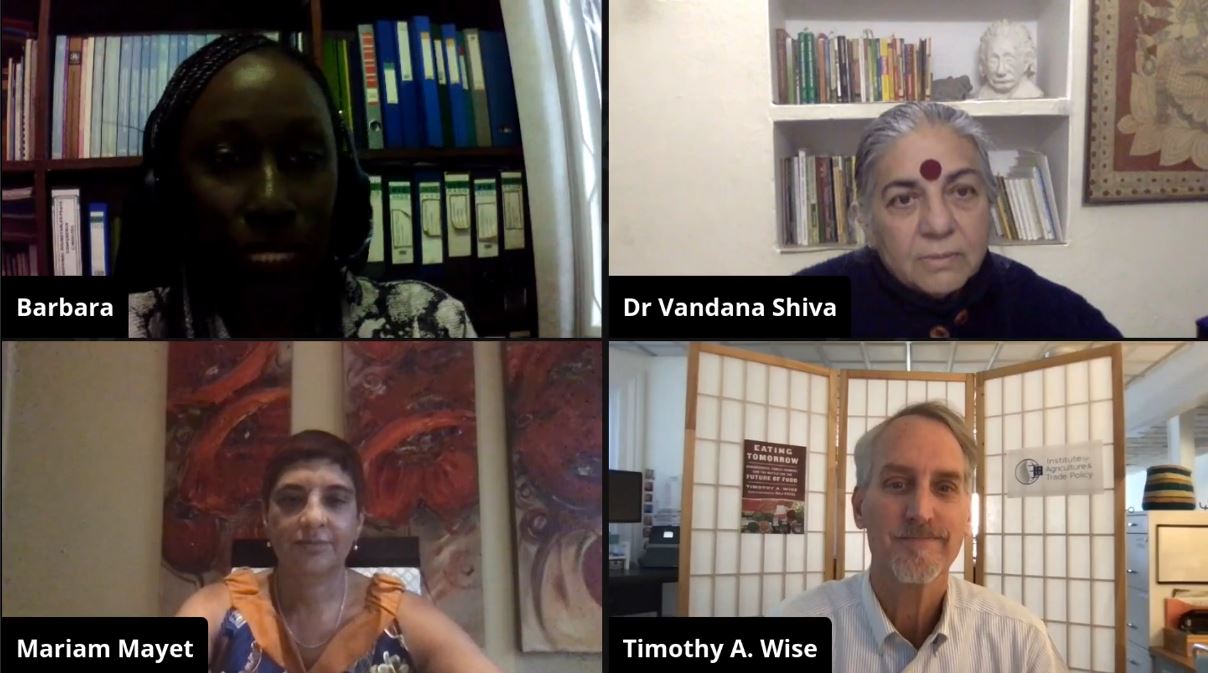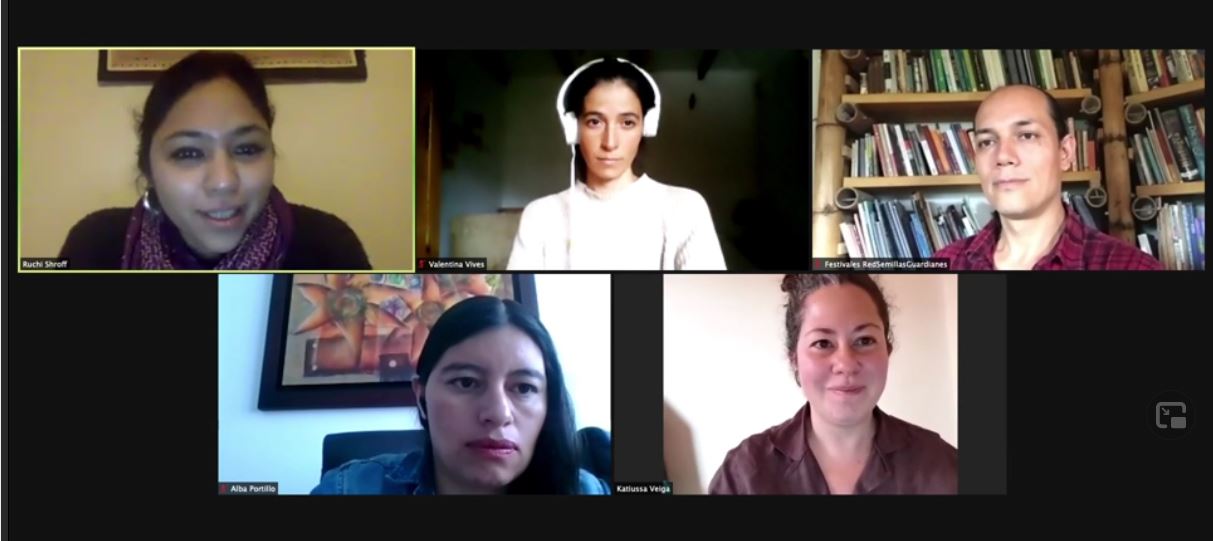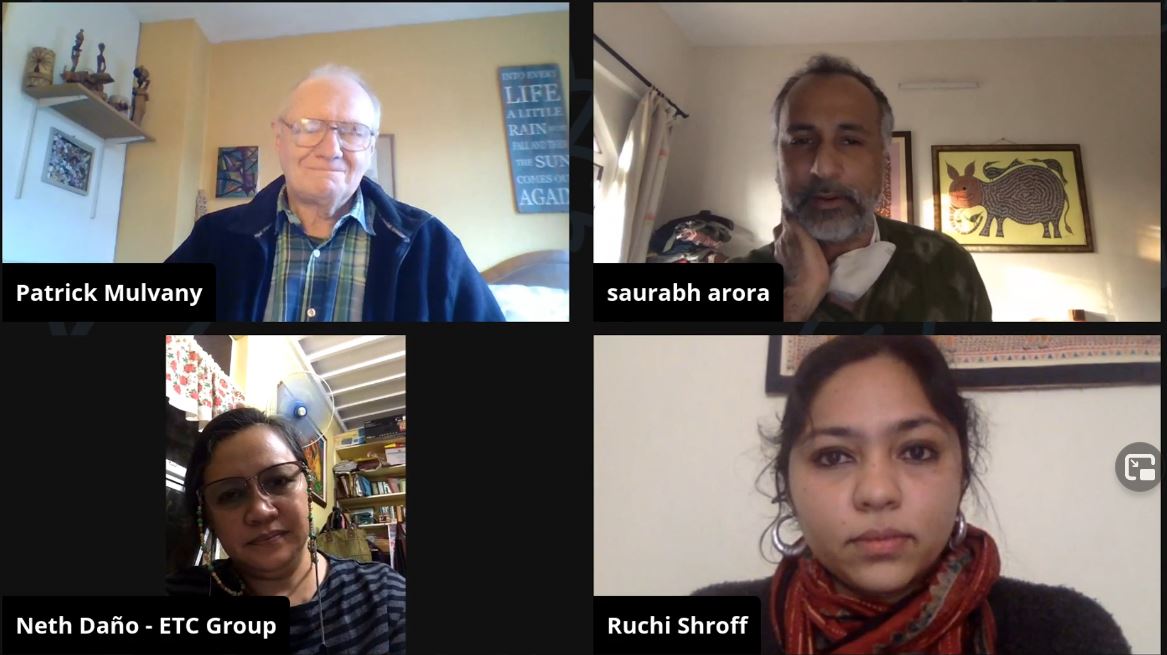This January 7-13, 2021 Navdanya International participated in the annual Oxford Real Farming Conference. Although previously based in the UK, the now online conference brought together multiple food and farming movements and actors− ranging from farmers, activists, policy makers and organizations− to discuss a variety of issues around the state of agroecological, organic and indigenous agricultural systems from all over the world.
 On the opening day of the conference, President of Navdanya International, Vandana Shiva spoke alongside author and senior adviser at IATP Timothy A. Wise; Mariam Mayet head of the African Centre for Biodiversity in a talk titled “Neo-colonial Economies and Ecologies, Smallholder Farmers and Multiple Shocks in Africa: Confronting False Solutions Towards Decolonization”. The session, moderated by Barbara Ntambirweki, centered around ways that colonization has historically taken place in Africa and Asia, and how modern-day industrial agriculture follows in the footsteps of this colonial legacy. Vandana Shiva explains, “Real farming is under severe threat and we all must join hands to defend real farmers, real farming, real food, because it is a survival imperative. Colonialism of the past and colonialism of the present follow the same pattern. My fellow farmers in India who have blockaded Delhi for more than a month are now in a fight for survival. Along the same lines, against the first wave of colonialism in India farmers and women stood up against the extraction and export of their resources and the famine caused by the lack of access to the crops they were growing for the colonial market. The wave of globalisation that followed in the 90s’ is what I call re-colonisation, with the World Bank’s structural adjustments, the GATT and WTO Agreement on Agriculture, the trade-related Property Rights Agreement, patents on seeds, which all basically made industrial food the only legal alternative.” The panelists emphasized how this colonial project will no longer be tolerated, as movements toward food sovereignty must band together to protect real food and the small farmers that feed us.
On the opening day of the conference, President of Navdanya International, Vandana Shiva spoke alongside author and senior adviser at IATP Timothy A. Wise; Mariam Mayet head of the African Centre for Biodiversity in a talk titled “Neo-colonial Economies and Ecologies, Smallholder Farmers and Multiple Shocks in Africa: Confronting False Solutions Towards Decolonization”. The session, moderated by Barbara Ntambirweki, centered around ways that colonization has historically taken place in Africa and Asia, and how modern-day industrial agriculture follows in the footsteps of this colonial legacy. Vandana Shiva explains, “Real farming is under severe threat and we all must join hands to defend real farmers, real farming, real food, because it is a survival imperative. Colonialism of the past and colonialism of the present follow the same pattern. My fellow farmers in India who have blockaded Delhi for more than a month are now in a fight for survival. Along the same lines, against the first wave of colonialism in India farmers and women stood up against the extraction and export of their resources and the famine caused by the lack of access to the crops they were growing for the colonial market. The wave of globalisation that followed in the 90s’ is what I call re-colonisation, with the World Bank’s structural adjustments, the GATT and WTO Agreement on Agriculture, the trade-related Property Rights Agreement, patents on seeds, which all basically made industrial food the only legal alternative.” The panelists emphasized how this colonial project will no longer be tolerated, as movements toward food sovereignty must band together to protect real food and the small farmers that feed us.
 Navdanya International’s Executive Director Ruchi Shroff served as chair of session, “Farmer’s Seed Systems in Latin America: A Perspective from the Field”. The panel featured Navdanya International partners and Seed Guardians of Latin America, such as: Javier Carrera founder of Ecuadorian Red de Guardianes de Semillas; Alba Portillo founder and coordinator of Colombian Red de Guardianes de Semillas de Vida; Valentina Vives coordinator and member of the Board of Directors of Chile’s Cooperativa Semillas Austral; and Katiussa Veiga from Ecotambo, a Bolivian agroecology network. The panelists narrate how advancing globalization and industrialization has imposed deep cultural loss through a food system not adapted to local needs, seed contamination and extractive mechanisms. In the wake of this, the speakers highlighted their work alongside local food communities to build up and expand regenerative food systems that sprout from the conservation of traditional seeds and ancestral knowledges. The talk drew on the wealth of experience of experimentation and revival of reciprocal economies, expanded living seed banks, education and organized political action are working toward securing food and sovereignty in their respective countries. In turn, the session gave a voice of hope to the multiple ways Latin American communities are working in tandem to resist the never-ending threats of laws and regulations in favor of industrial agriculture.
Navdanya International’s Executive Director Ruchi Shroff served as chair of session, “Farmer’s Seed Systems in Latin America: A Perspective from the Field”. The panel featured Navdanya International partners and Seed Guardians of Latin America, such as: Javier Carrera founder of Ecuadorian Red de Guardianes de Semillas; Alba Portillo founder and coordinator of Colombian Red de Guardianes de Semillas de Vida; Valentina Vives coordinator and member of the Board of Directors of Chile’s Cooperativa Semillas Austral; and Katiussa Veiga from Ecotambo, a Bolivian agroecology network. The panelists narrate how advancing globalization and industrialization has imposed deep cultural loss through a food system not adapted to local needs, seed contamination and extractive mechanisms. In the wake of this, the speakers highlighted their work alongside local food communities to build up and expand regenerative food systems that sprout from the conservation of traditional seeds and ancestral knowledges. The talk drew on the wealth of experience of experimentation and revival of reciprocal economies, expanded living seed banks, education and organized political action are working toward securing food and sovereignty in their respective countries. In turn, the session gave a voice of hope to the multiple ways Latin American communities are working in tandem to resist the never-ending threats of laws and regulations in favor of industrial agriculture.
 Lastly, Ruchi Shroff participated as a panelist for the session, “Exporting Technofixes, Colonialism and Resistance”, alongside Neth Daño– the co-executive director and Asia-Pacific director of ETC Group; Patrick Mulvany– member of the Food Ethics Council, and a CAWR Honorary Research Fellow; and Saurabh Arora– senior lecturer at Science Policy Research Unit at the University of Sussex and chair of the session. The panelists highlighted how the idealization of technology as the sole mechanism with which to solve our current converging crises is being justified through the lines of Africa, Latin America and Asia being routinely ‘behind’ due to insufficient access to new technologies, poor country infrastructure, poor seeds, and backwards and inefficient farming practices. But ironically, while we all know that our current dominant food system is failing, the same actors, giant corporations and power structures that created our current crises are trying to sell us the solution. Technology and industrialization are then forcefully imposed by a strategic nexus between international institutions, agribusiness and biotech corporations, research centers, governments, financialization instruments and philanthrocapitalists, without any consideration of their potential impact. What these aggressive impositions and narratives accomplish in actuality is disposes communities of their rights, their territories, and their diversity while then gathering up profits from that which has been stolen and shut down. The contemporary global economy is based on the reinvention of this colonizing process, serving to open up new markets of profit and power. So in the end, the colonisers end up defining the historic narrative and its justification, and write the rules and laws which serve to legitimise this sacking of lands, resources and wealth perpetrated against communities. These narratives then shape how we think about problems and solutions, erasing complexity and alternative ways of thinking, leaving us with technology as the only imagined mechanism to solving the problems this process created in the first place. In terms of food and agriculture, Ruchi Shroff explained how, “In a world where our surroundings are becoming more and more artificial, food and agriculture stand as one of the last frontiers that must not be co-opted by these false solutions. Especially when we know that agroecology, food sovereignty and diversity can serve as real solutions to our multiple crises.”
Lastly, Ruchi Shroff participated as a panelist for the session, “Exporting Technofixes, Colonialism and Resistance”, alongside Neth Daño– the co-executive director and Asia-Pacific director of ETC Group; Patrick Mulvany– member of the Food Ethics Council, and a CAWR Honorary Research Fellow; and Saurabh Arora– senior lecturer at Science Policy Research Unit at the University of Sussex and chair of the session. The panelists highlighted how the idealization of technology as the sole mechanism with which to solve our current converging crises is being justified through the lines of Africa, Latin America and Asia being routinely ‘behind’ due to insufficient access to new technologies, poor country infrastructure, poor seeds, and backwards and inefficient farming practices. But ironically, while we all know that our current dominant food system is failing, the same actors, giant corporations and power structures that created our current crises are trying to sell us the solution. Technology and industrialization are then forcefully imposed by a strategic nexus between international institutions, agribusiness and biotech corporations, research centers, governments, financialization instruments and philanthrocapitalists, without any consideration of their potential impact. What these aggressive impositions and narratives accomplish in actuality is disposes communities of their rights, their territories, and their diversity while then gathering up profits from that which has been stolen and shut down. The contemporary global economy is based on the reinvention of this colonizing process, serving to open up new markets of profit and power. So in the end, the colonisers end up defining the historic narrative and its justification, and write the rules and laws which serve to legitimise this sacking of lands, resources and wealth perpetrated against communities. These narratives then shape how we think about problems and solutions, erasing complexity and alternative ways of thinking, leaving us with technology as the only imagined mechanism to solving the problems this process created in the first place. In terms of food and agriculture, Ruchi Shroff explained how, “In a world where our surroundings are becoming more and more artificial, food and agriculture stand as one of the last frontiers that must not be co-opted by these false solutions. Especially when we know that agroecology, food sovereignty and diversity can serve as real solutions to our multiple crises.”
Also read:
Programme
Neo-colonial Economies and Ecologies, Smallholder Farmers and Multiple Shocks in Africa: Confronting False Solutions Towards Decolonization
–
7 January 2021, 3pm – 4pm GMT
Speakers
Chair
Learn more
Farmer’s Seed Systems in Latin America: A Perspective from the Field
–
9 January 2021, 6pm – 7pm GMT
Speakers
Chair
Ruchi Shroff, Navdanya International
Learn more
Exporting Technofixes, Colonialism and Resistance
–
12 January 2021, 12pm – 1pm GMT
Speakers
Ruchi Shroff, Navdanya International
Chair
Learn more
